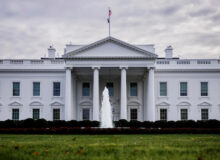The accusations stem from Mr. Sessions’s unsuccessful nomination for a federal judgeship in 1986. The Senate Judiciary Committee voted down that nomination after hearing testimony about remarks Mr. Sessions had purportedly made in the early 1980s that were deemed racially insensitive. Throughout three intervening decades of public life, Mr. Sessions hasn’t evinced an iota of racial animus. Yet Democrats are clucking that the now-ancient incidents—disputed even then as taken wholly out of context—should disqualify Mr. Sessions from being attorney general.
What should be far more relevant is a conversation Mr. Sessions had, and a legislative course he pursued, after being elected to the Senate in 1996. My small part of that story begins two years later on the steps of the U.S. Capitol.
Will this presidential election be the most important in American history?
In 1998 I arrived in Mobile, Ala., to write editorials for the daily Register newspaper—and I held my own private doubts about Sen. Sessions. As a self-styled “Jack KempRepublican” determined to expel vestigial racism from the conservative movement, I had been a founding board member of the Louisiana Coalition Against Racism and Nazism. That was a group formed in 1989 to end the then-ascendant political career of former Ku Klux Klan leader David Duke. I was thus naturally wary of Sen. Sessions, who supposedly had told a joke making light of the Klan’s evils.
On my first reporting trip for the Register to Washington, D.C., I requested interviews with both of Alabama’s senators. The timing was bad—lawmakers were in session—but Mr. Sessions’s press aide said the senator was eager to talk. I was instructed to meet him, between votes, on the Capitol steps.
Long story short, Sen. Sessions was on a mission. He wanted somebody, anybody, to write about the importance of American policy toward Colombia. That U.S. ally was at risk of being toppled by the narco-financed, communist guerrillas known by the acronym FARC.

It was a subject far from my interests. But Mr. Sessions put the stakes in memorable context. The senator can be a discursive speaker, but he kept returning to a central contention: FARC-allied drug lords were responsible for much of the cocaine that polluted the American streets. As a former federal prosecutor, he was concerned about the violent crime accompanying the cocaine scourge.
He spoke about addicts and criminals not with vilification, but with compassion. “You’ve got these poor guys in the inner city,” I remember him saying. “Nobody provided them much of an education; they can’t find a job; and somebody tells them they can get high for relatively cheap by smoking these crack rocks. They get addicted and they do something terrible and end up in jail and their lives get ruined. We’ve gotta help our Colombian allies defeat these drug lords at the source, where they grow this stuff. It’s just ruining all these lives.”
It was this same train of thought—compassion for the users of crack cocaine—that led Sen. Sessions to introduce the Drug Sentencing Reform Act in 2001. The law at the time punished crack cocaine 100 times more harshly than powdered cocaine. Mr. Sessions specifically argued that this created unfair racial disparities, since crack was the drug of poor inner cities, while powder was favored by white Wall Streeters. Such compassion for black addicts is far from a hallmark of someone motivated by racial animus.
Finally, Congress passed and President Obama signed the Fair Sentencing Act of 2010, reducing the disparity. Mr. Sessions was one of the bill’s three lead authors—a testament to his doggedness in the pursuit of equal justice.
In 18 years of closely covering Sen. Sessions (including numerous off-the-record conversations), I’ve never heard a mean word from his lips or seen a single sign that raised my Kempian hackles. Mr. Sessions has now served 20 years in the Senate. No racist could keep bigotry closeted for so long. And none, surely, would work so hard, risking political capital, to fix sentencing laws that had proved in application to be racially discriminatory.
(by Quin Hillyer in the WSJ)







